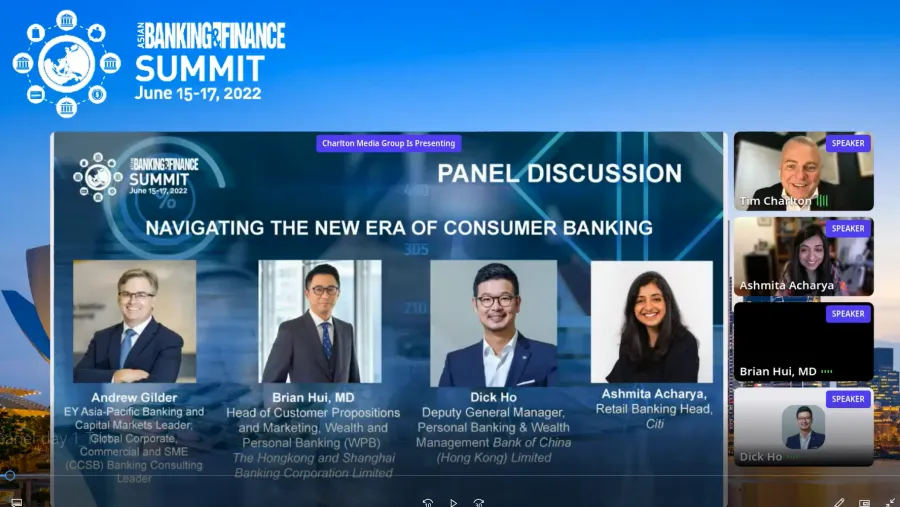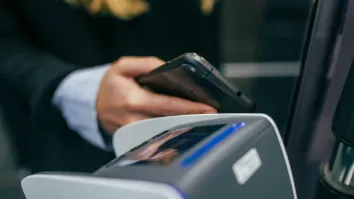
Need for instant fulfillment fuels incumbent banks’ speedy digital transformation
Expect more digital banking features to be rolled out and possibly even the rise of megabanks amidst an increasingly digital-savvy banking and finance sector that seeks instant fulfillment, senior executives of three of Asia’s top banks told attendees of ABF Summit 2022 Day 1 closing panel moderated by Andrew Gilder, Asia-Pacific Banking and Capital Markets Leader; Global Corporate, Commercial and SME (CCSB) Banking Consulting Leader, EY.
Brain Hui, HSBC MD and Head of Customer Propositions and Marketing, Wealth and Personal Banking (WPB), revealed that HSBC rolled out over 200 new digital features in its mobile app just last year in its quest to make digital banking as convenient as possible for its customers stuck at home. “Literally one digital feature being delivered per working day,” Hui told attendees of the panel on June 15.
“I will say, it's less about the platform, because if we're talking about infrastructure. it's still the same platform, but with [a] much more hyper personalized design,” Hui said. “What is more important is how we make it agile during this situation.”
As customers become more technologically inclined, so does their appetite for faster services and more options, all three of the panel speakers agreed. This is because banking becomes less confined to the finance space, but starts to extend to other industries that involve technology, such as mobile games and e-commerce–where digital natives have become used to fast processing times and instant gratification. Take payments, for example.
“Paying is no longer compared to [other] banks. Payments [is] compared to many different industries. And that creates a huge impact because the customer and the expectation from different industry different apps are basically the same. And what I see in the new normal is a minimum expectation that the consumer will have instant fulfillment,” noted Dick Ho, Deputy General Manager, Personal Banking & Wealth Management Bank of China (Hong Kong) Limited.
The need for instant fulfillment is complicated by the fact that, as a highly regulated market, banking processes tend to take more time than online shopping’s cart out and deliver now options.The question of security also comes into play.
Ashmita Acharya, Retail Banking Head, Citi Singapore, noted this challenge, especially given the recent surge of scams in Singapore’s banking sector.
“I think between ABS [Association of Banks in Singapore] and MAS [the local regulator], there's been a huge amount of focus in keeping offline safe. And that's something that is becoming top of mind. So it’s a balance between going to a completely digital payment ecosystem and keeping the client safe, keeping the ecosystem safe,” Acharya said.
The more, the merrier
Citi’s Acharya also pointed out banking customers' need to have access to more services–also the inspiration behind HSBC rolling out hundreds of new features in their platform, as HSBC’s Hui earlier noted.
“Clients want more options, more accessibility. They want better pricing, whether commission free robo-advisory. They want greater access to education opportunities, investment markets, or to financial instruments, across all segments,” Acharya said.
HSBC’s Hui agreed. “What they want is more choices, faster speed, lower price. Strategically we always ask ourselves, what exactly is the thing that is not going to change, and hence, the business model itself will sustain,” he said, commenting on how banks plan to ride out the rise in digitization and the dawn of neobank disruptors.
For Citi’s Acharya, there is room for all banks to thrive in the new digital norm. “The entrants who are coming in are going to make us incumbents be better and smarter, because we do have the information, we do have the ability to offer up a much more broader proposition than some of these new virtual entrants, because they're very targeted, they're going from one of the slivers, either as SME banking, or they're going in for payments, or they're going in for a very deposit-taking strategy or lending,” she said.
Megabank or fintech
Asked about the future of banking, BOCHK’s Ho, Citi’s Acharya, and HSBC’s Hui all noted that it will be more digital and tech-embedded than now.
BOCHK’s Ho, noted that the future will be one that involves intelligent smart banking. “With AI, we basically we can understand customer a lot more and also we can predict their liking,” he said, adding that in the future the bank will be able to subtly provide support to the customer depending on their lifestyle changes.
HSBC’s Hui believes that there will be two modes. “I believe in the future the entire banking industry would have only two models. One is a mega bank, [where] you've got the scale, you've got the data. You are able to leverage the data to do hyper personalization, and hence [offer] a better experience.”
The second model will see banks evolve into a FinTech player. “But no matter if its tech fin or fin fintech, this industry is a trust based industry. It’s a highly regulated, risk managed industry. At the end of day it is about what sort of proposition you put on the table and hence you will drag back better customer experience,” Hui added.
Watch the video below to watch the panel discussion:



















 Advertise
Advertise











